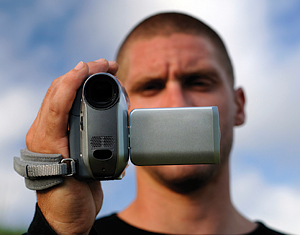CNN Introduces 'All-Platform' Journalists
CNN has turned "one-man bands" into "all-platform" journalists, and announced an "expansion" of newsgathering with such people in 10 American cities.
Since all of the media coverage I can find positions CNN's announcement as a good thing, let me be among the first to disagree. As with most news cost-cutting moves these days, CNN is simply trying to put a positive spin on a negative situation.
ONE-MAN BAND
Forty years ago, I began working for news operations as a one-man band. That meant keeping a Bell & Howell Filmo 16mm film camera under the front seat of my car to photograph occasional breaking news. That's the way the term got started and how I earned college beer money.

There is more to producing news than point-and-shoot video clips. This is where CNN's "all-platform" journalism system falls short. With the arrival of portable digital camcorders, laptop computers with editing software, and high-speed Internet connections, now virtually anyone can produce what's termed "news content." Shoot, edit and feed. It is a quick way to get mediocre pictures from point "A" to point "B."
But, as any veteran of the news business knows, there's much more to producing news than moving about point-and-shoot video clips. This is where CNN's "all-platform" journalism system falls short. In creating this concept, the network is attempting to combine the skill sets of at least four people into one.
Of course, people can be trained. But how well it's done is another matter completely. It takes many years for each skill set to develop. The idea that some six-week training course can teach a person four lifetimes of news production skills is ludicrous.
INTEGRAL PARTS
First, take the reporter. Few good reporters that I've ever known are also competent technicians. The skill sets are totally different. The reporter is the ultimate generalist—quick to grasp any subject.
For this reason, the reporter needs a liberal arts education, with lots of history, English language studies, political science and other general training. The reporter needs to think on his feet about the story, and probe any situation with the right questions.
What goes with that are strong writing skills. The ability to write a quick—yet meaningful—stand-upper on location is critical. That segment must fit within the edited context of the complete story. In the old days, reporters also had producers to help with this function. Those days are long gone.
Next, there's the camera operator—a person who must master the technology and the tools of imagemaking. In earlier days, the camera operator was joined by a sound operator and lighting technician on most shoots. Forget that today.
In the one-man-band world, the camera operator must get good, well-lit pictures and acceptable sound. That should mean turning off the camera's "auto" everything buttons. Poor image composition, too much zooming, a shaky camera, and blown out backgrounds all combine to create bad production values.
Of course, good sound is always more important than good video. Check out any feature film. It is usually the "big" sound that's more impressive than the images. How do you worry about getting good sound with all else going on? Beats me!
And, with modern video cameras one can shoot in just about any kind of light. But do you really want to? Good images are crafted from light and shadow. Lighting is an art form that all good imagemakers must learn. Today, most one-man bands know zero about lighting.
To shoot good video, the skills of three people must come together: the videographer-director-engineer, the sound operator and the lighting director. Under each of these categories are subsets of other personnel that were traditionally used in production. But the skills of the big three are absolutely necessary. Reporting skills come on top of that.
FAILURE IS NOT AN OPTION
The failure of any of these skills sets means a video production will be inferior. By placing all of this in the hands of a single person, the scale of responsibility collapses. Perhaps CNN has trained a group of video geniuses for these jobs, but I highly doubt it.
Instead, I suspect that CNN has lowered the standards of what they expect from each "multiplatform" journalist. Good reporting will be replaced by the 30-second clip of some "breaking" news story. Forget investigative reporting, or even inquisitive probing into a story. There will be too many technical issues to worry about.
When CNN tells us they are launching news bureaus in Columbus, Ohio; Denver; Houston; Las Vegas; Minneapolis, Minn.; Orlando, Fla.; Philadelphia; Phoenix; Raleigh-Durham, N.C.; and Seattle, it sounds like progress. When they tell us all this is possible due to "advances in technology," we should be very suspicious.
Genuine quality comes from old-fashioned news reporting. There are fewer real reporters in the field today than ever before, mainly due to cutbacks and layoffs.
Don't be fooled by the term "all-platform" journalism. It's a creation by public relations people. CNN is trying to convince you that it's not dumbing down the news. Unfortunately, that's exactly what is happening.
Get the TV Tech Newsletter
The professional video industry's #1 source for news, trends and product and tech information. Sign up below.
Frank Beacham is an independent writer based in New York.

